Greetings pea head.
So you’re hunting for some small size sunglasses? If you’ve struggled to find the right shape and style, this guide is the one for you.
In this article, we recommend the best sunglasses for small faces so you can find a pair that looks great, feels comfortable and properly protects your eyes. Whether you're looking for something classic or modern, we've got you covered.
Let’s get started.
What kind of sunglasses suit a small face?
Sunglasses with small lens and bridge widths are best suited for small faces. Not only does this looks better but is simply more comfortable and stops the frame from sliding down your nose.
Furthermore, better-fitting sunglasses provide better protection from UV (ultraviolet) light. If your frame keeps sliding down, your eyes are more likely to be exposed to the sun increasing your chances of visual fatigue or even retinal damage.
How do I know my size in sunglasses?
To know your sunglasses size, it's ideal if you can check your current (well-fitting) sunglasses frame for a series of digits that resemble: 52 [] 20 145. These denote your lens width, bridge width and temple length in millimetres.
If you don’t have sunglasses to check this, use the guide below.
How to measure your face for sunglasses
To measure your face for sunglasses, check your face-width, nose-bridge-width and your eye-to-ear distance in millimetres. These inform the three main size aspects of sunglasses frame size; lens width, bridge width and temple length.

Lens width is determined by the overall width of your face, measured between each of your temples. (The soft skin located between your eyes and ears above your cheekbones.) Small facial widths need smaller lens widths, ranging from 115mm (small) to 160mm (large.) Check your ideal lens width in the table below.
|
Face size |
Ideal lens width |
Sunglasses size |
|
115 - 130mm |
49 - 54mm |
Small |
|
135 - 140mm |
55 - 57mm |
Medium |
|
145 - 160mm |
58 - 63mm |
Large |

Bridge width is determined by your facial structure. Measuring bridge width yourself is difficult, so an easier method is to observe your face side-on using a self-portrait photograph. If your nose bridge is level or below your pupils, you need a smaller bridge width around 14 to 17mm. If your bridge sits above your pupils, you need a larger bridge with of 18 to 21mm.
It’s worth mentioning that ethnicity can influence how spectacles or sunglasses fit your face. East Asian craniofacial structures often have low nose bridges and high cheekbones which can cause a poorly fitting frame, often sliding down the wearer’s nose or resting on their cheeks. Subsequently, you may need a very narrow nose bridge of less than 16mm which are found amongst Asian fit sunglasses. For a guide on this, click here.
|
Bridge width |
Sunglasses size |
|
14mm - 17mm |
Small |
|
18mm - 21mm |
Medium |
|
22mm - 25mm |
Large |

Temple length is determined by the distance between your eye and ear. Use a ruler to carefully measure from the corner or your eye to the top of your ear. Small sunglasses have temple lengths of around 130mm, whilst larger sunglasses have temples usually 145mm or longer. Even if you have a small face, you may not need a shorter temple length.
| Eye to temple |
Ideal temple length |
Sunglasses size |
| 80 - 90mm |
120 - 130mm |
Small |
| 90 - 100mm |
130 - 140mm |
Medium |
| 100 - 110mm |
140 - 150mm |
Large |
| >110mm |
>150mm |
Extra Large |

What sunglass shape is best for my face?
The best sunglasses are those that contrast your face shape. If your face is round, choose a square boxy frame. If your face is narrow and bony, choose a round shaped frame. Here are a list of the basic face shapes and the best frame suggestions.
Square face: Your jawline and forehead are equally wide. Choose large boxy sunglasses to make your head seem narrower.
Round face: You have wide cheeks and a soft chin. Choose rectangular or square sunglasses to add definition and structure to your face.
Triangle face: Your forehead is widest with bony cheekbones and narrow pointed chin. Choose round or oval sunglasses to balance your defined facial features.
Heart face: You have a widow’s peak hairline and high cheekbones. Rectangular or rounded-rectangular frames will suit you best.
Long face: Your forehead is tall with narrow cheekbones and a long chin. To make your face look shorter, wear sunglasses with tall lenses like Aviators or big square shades.
Oval face: Similar to a round face, you have soft cheeks and a soft chin. To sharpen your look, choose angular sunglasses with straight lines and sharp corners.
Diamond face: You have defined, high cheekbones and a strong jawline. To balance your skeletal features, wear round or oval sunglasses with softened lens corners.
Best women's sunglasses for a small face

Round sunglasses
If your face is particularly defined with high cheekbones, round sunglasses are great way to bring visual balance to your face. With your narrow features and bony cheeks, circular shades are an effortless way to compliment your look with a vintage style.
Look for small size frames with a lens width of 47mm or so to get the right fit for your small face. The Ray-Ban Junior RJ 9547S is a prime example of a classic round wire sunglasses frame that's both lightweight and stylish.
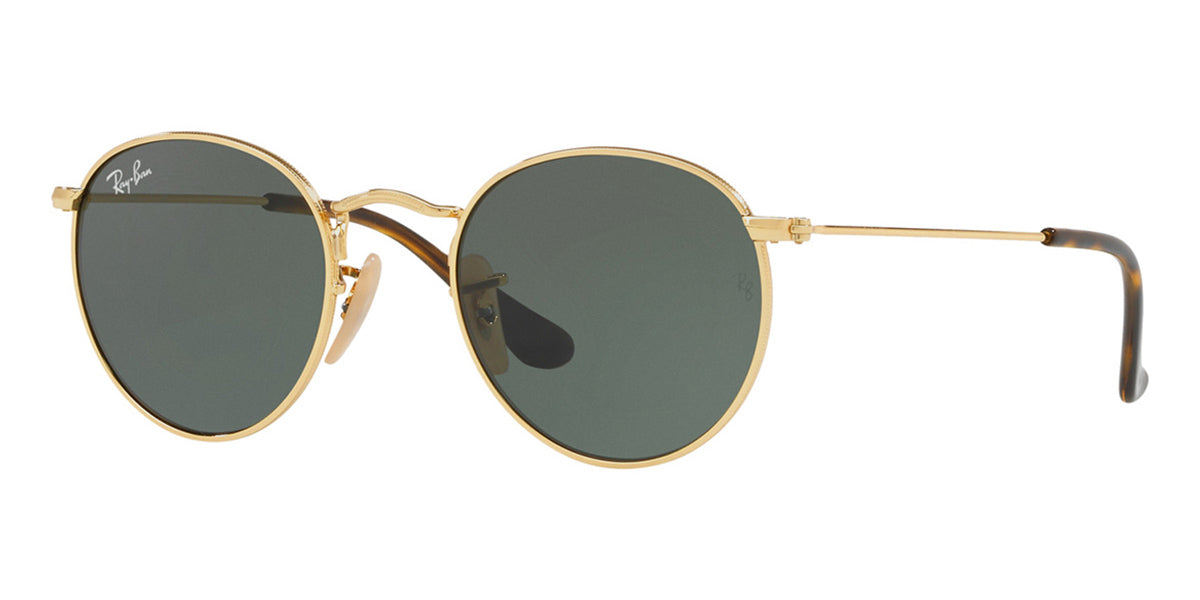

Cat eye sunglasses
Fresh out the 1960’s, cat eye sunglasses are a truly classic look. With their upward swept end pieces, the retro style of these sunglasses suit a large variety of face shapes. Cat eye sunglasses convey a sense of confidence and power, a great look behind a set of dark tinted lenses.
For a contemporary cat eye sunglasses look, check out the Dita Kader frame. The transparency of these crystal acetate shades reveal the beautiful gold-plated hardware within. A luxurious cat eye frame with decadent detailing.
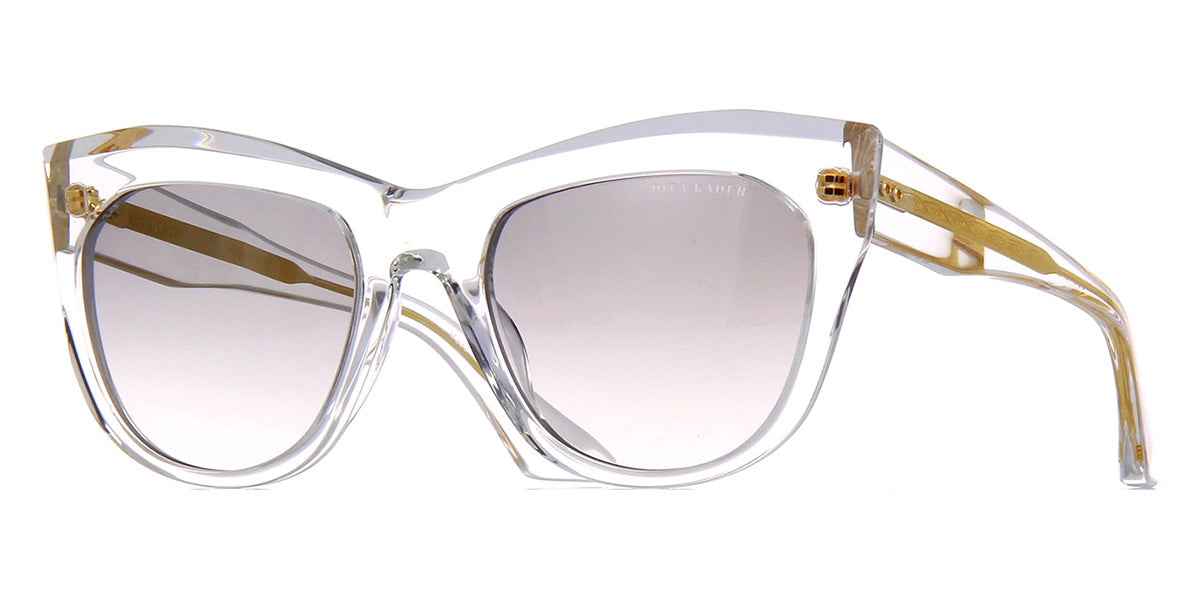

Oval sunglasses
For female faces that are small and delicate, oval sunglasses are the perfect choice. They lend a touch of sophistication and refinement while still accentuating the wearer's natural beauty. With their gentle curves and graceful lines, oval shades have a timeless appeal.
For a small but stylish oval-style sunglasses frame, check out the Garret Leight Ocean. These two-tone sunglasses feature a black frame front with contrasting tortoise shell pattern temple arms.
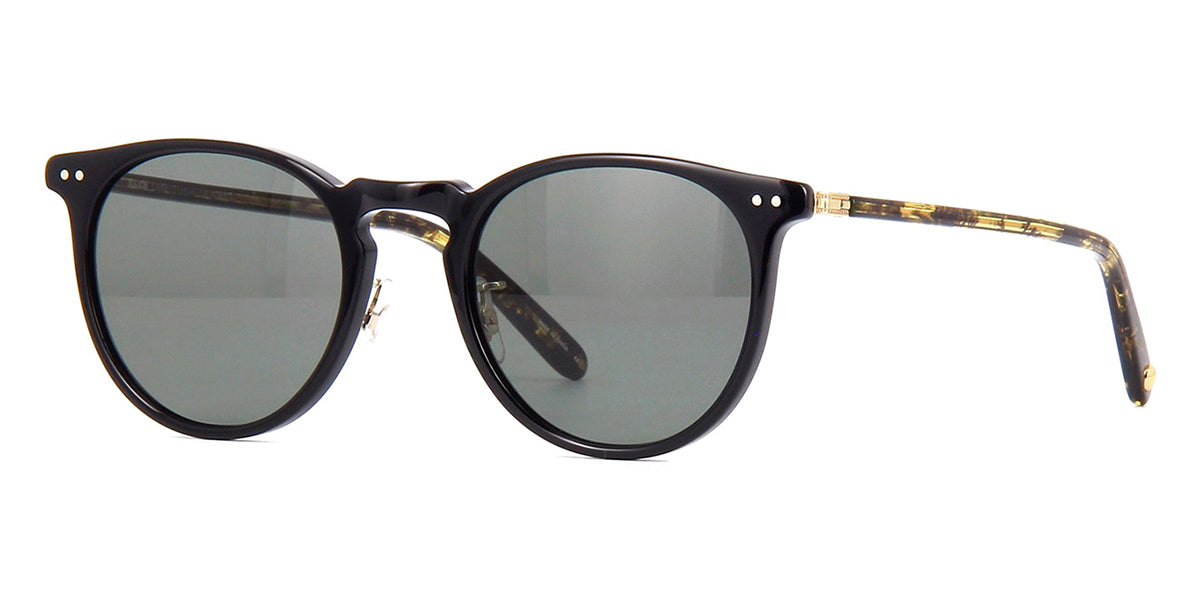

Tortoiseshell sunglasses
Of all the patterns, tortoiseshell acetate is one of the most classic. Designed to mimic real tortoise shell, flecks of brown, amber, honey and black bring a timeless look to any shape of sunglasses frame. No matter your skin complexion, pale or deep, tortoiseshell sunglasses are a classic colourway that’s forever fashionable.
For a stylish and versatile sunglasses frame, the Chanel 5380 is a dominant square shape. On your small face, these tall shades provide ample coverage over your eyes and surrounding skin. A nice way to block harsh sunlight whilst channelling some strong Audrey Hepburn vibes.
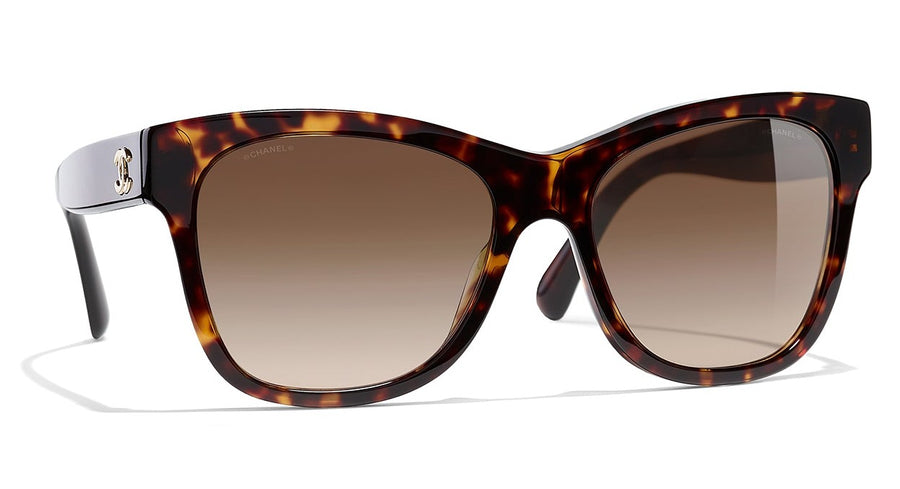
Best men's sunglasses for a small face

Rectangular sunglasses
Rectangular sunglasses are the perfect frames for any man with a small face. Boxy looking shades convey strength and confidence with their sharp angles and clean lines.
Whilst this might sound childish, RayBan's Junior range have become renowned for working especially-well for adults with small faces. Their most famous flagship sunglasses frame are of course the perennial-cool Wayfarer model as seen below. A stylish full-rim frame that suits literally anyone, you can't go wrong with a set of htese.
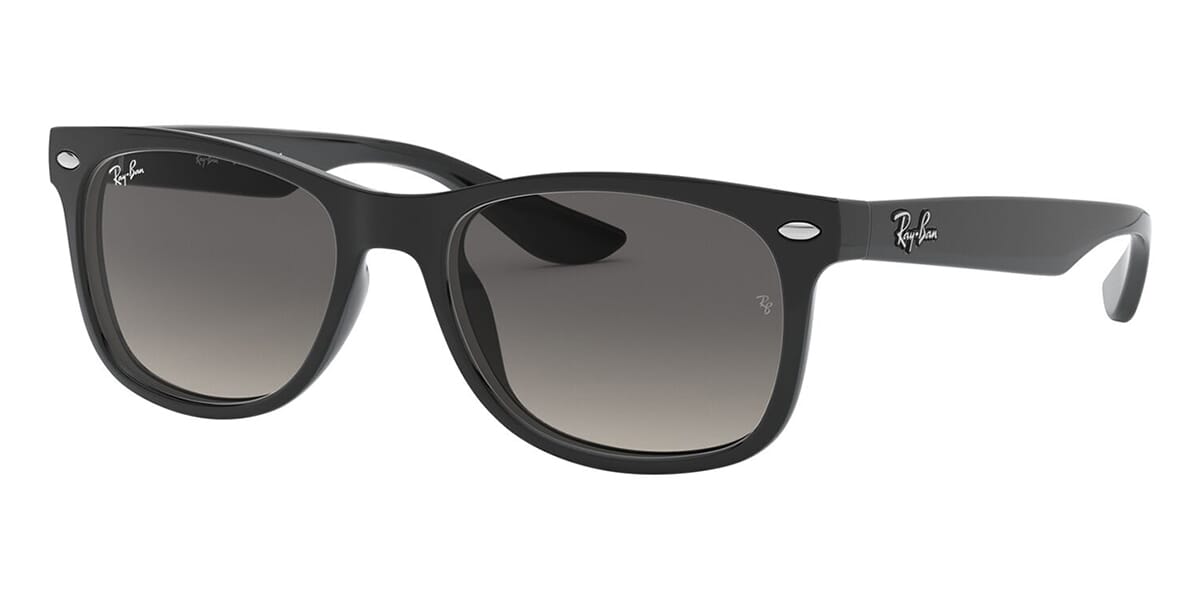

Clear sunglasses
Known as crystal or transparent frame sunglasses, clear acetate frames are a stylish choice. Combined with dark sun lenses, see-through acetate is a fantastic way to showcase the finer details and highlights of your frame. Seen within, the rivets, screws and hardware will catch the sunlight beautifully for a characteristic look.
In terms of colour, clear acetates can be neutral or lightly tinted in pastels of blue, green, yellow and many more. If opaque acetates seem to bold for you, try a crystal-coloured frame instead such as the Garrett Leight Carlton.
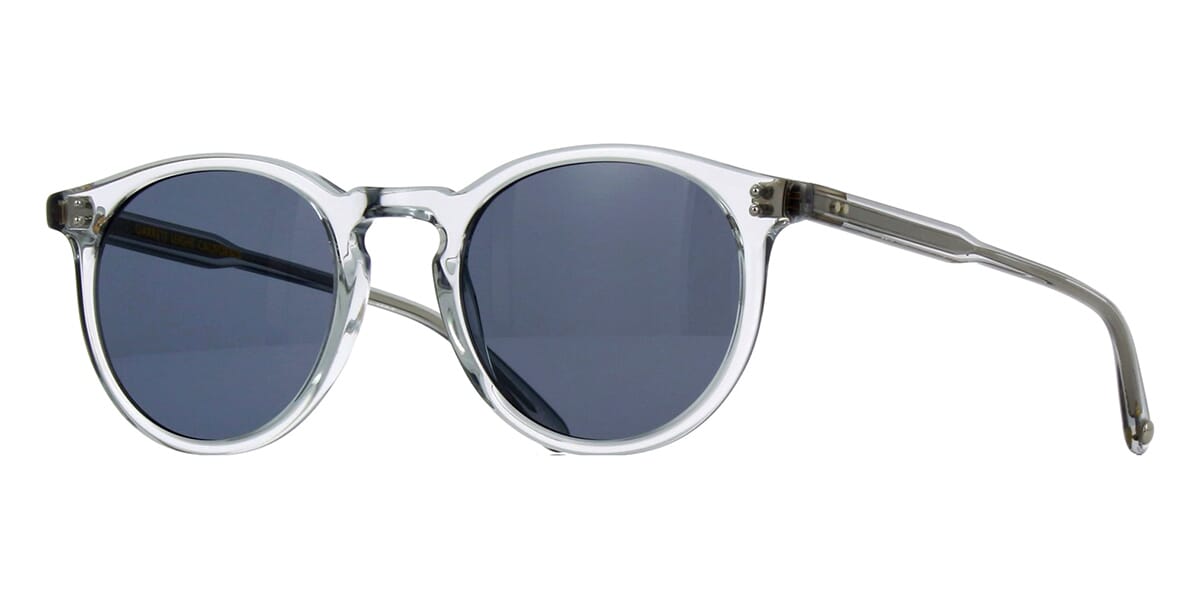
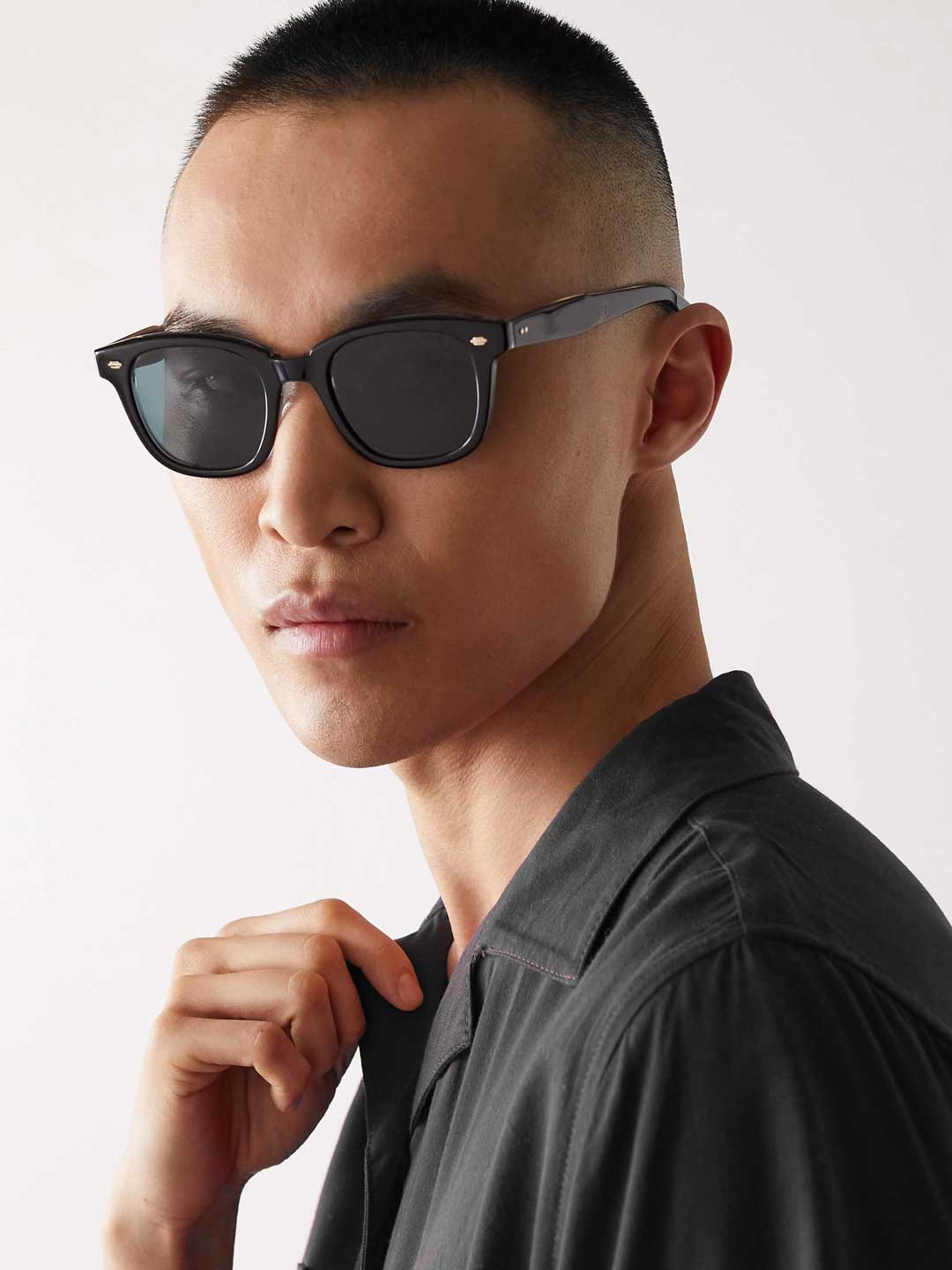
Square sunglasses
Small square frames are the perfect way to make a statement for men with small faces. These frames look bold, confident and assertive. With their clean lines and sharp angles, square frames convey authority.
For a punchy looking sunglasses style, check out the Garrett Leight Calabar frame. These angular shades are akin to the Wayfarer design, but with more luxurious detailing and high quality components.
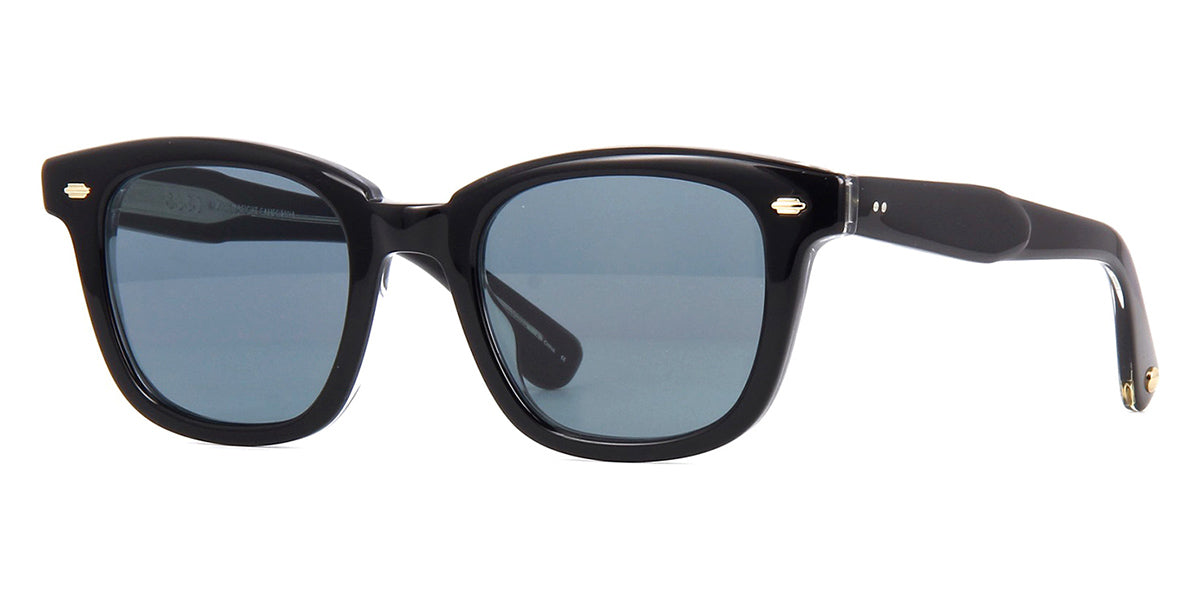

Aviator sunglasses
Aviator sunglasses are known for their dominant size and large lens coverage. But that doesn’t make then exclusive to large heads. If you’re looking for a Pilot style frame that fits you well, look for small sized Aviators with a suitably small lens and bridge width.
Ray Ban's Junior range are especially popular for those with smaller head sizes. Their most popular editions such as their Aviator frame (below) prove that small sunglasses are just as stylish as their larger counterparts.
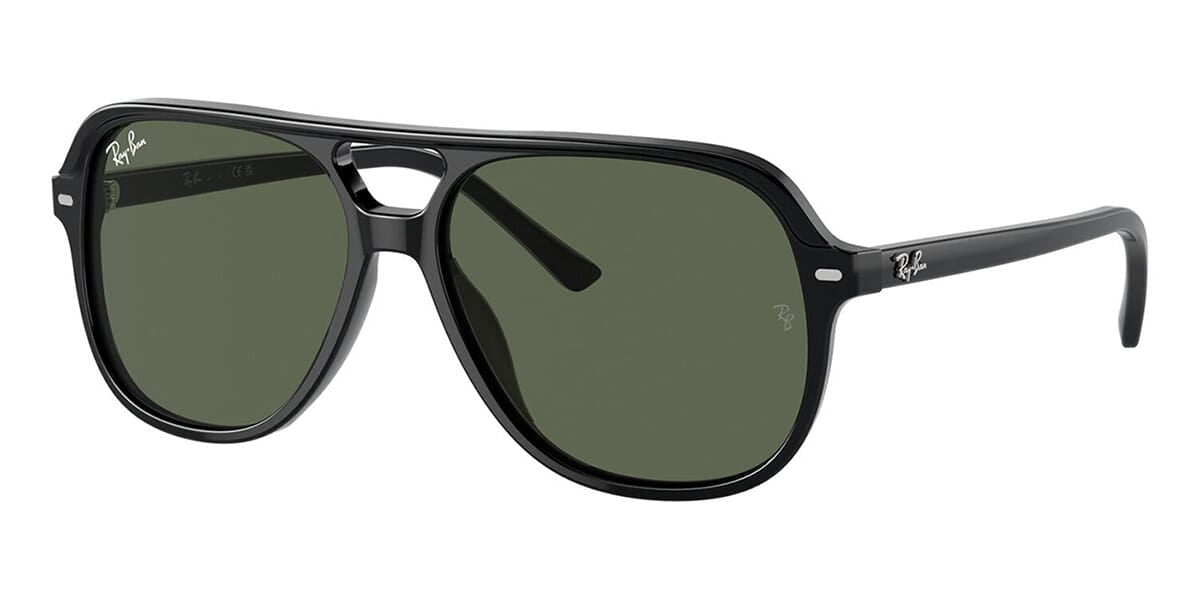

Tips for choosing sunglasses for small faces
#1 Frame size is crucial, so it’s best to know your ideal sunglasses dimensions. Once you know them, keep a note of your ideal lens width, bridge width and temple length.
#2 Your face shape influences which style of frame suits you best. Frame shapes which contrast your facial features create visual balance for a better look. Soft, round faces generally suit boxier shades. Long, defined faces tend to suit rounded frames.
Unlike spectacles, dark lenses make sunglasses much bolder on your face. This contrast allows for stronger frame colours which you can experiment with.
As a side-note, darker lenses don’t mean they provide better protection. Always check sunglasses for the UV400 rating which means they protect your eyes from the sun’s damaging UVA and UVB frequencies. Lens darkness is purely for visual comfort and not an indicator of protection.
#3 Your lifestyle can determine which type of sun lenses you should use. For sport or driving, polarised sunglasses reduce eye-fatigue over long durations of exposure. For recreational and fashion use, non-polarised lenses are less expensive and work well for everyday tasks.
For sport, specific lens colours can help you see in certain light conditions. But for recreational use, coloured lens tints can be a fashionable way to stylise your sunglasses frame. Be sure to choose a lens darkness that is comfortable to wear and is UV protective.
Use a protective case to store your sunglasses when you aren’t wearing them. This prevents damage to your frame and lenses.

What do polarised sunglasses mean?
Polarised sunglasses contain a filter which blocks glare from reflective surfaces such as the sea, wet roads, snow or surrounding buildings. This provides more consistent vision, better colour and depth perception and enhanced visual acuity.
By reducing visual fatigue over long durations of exposure, polarised lenses reduce eye-strain off for a smoother and less strenuous optical experience.
Both polarised and non-polarised sun lenses are UV protective, but polarised versions have the secondary benefit of glare reduction.
For a more technical explanation, sunlight is made of randomly orientated waves. When these light waves reflect off water or glass, they become condensed and mostly horizontally orientated, otherwise known as glare.
Polarised lenses filter-out these condensed light waves so you can see more clearly. This is what makes polarised sunglasses favourable for activities like fishing, boating or driving where reflected light can be exceptionally bothersome and taxing on your eyes.

Should sunglasses cover eyebrows?
For maximum coverage and eye protection, sunglasses are actually better if they cover your eyebrows. Although this conceals facial expression, large sunglasses reduce unfiltered sunlight from entering your eyes from above of the sides of the frame. If sunglasses cover your eyebrows, they simply provide greater overall protection from the sun’s damaging UV rays.
Inversely, spectacle frames aren’t for UV protection, therefore it’s better to wear reading glasses which don’t cover your eyebrows. This allows for better social interaction as people can read your facial expression more clearly.

Do oversized sunglasses look good on small faces?
Yes, oversized sunglasses can suit small faces, but only if the frame fits correctly. Be sure to choose the correct lens width, bridge width and temple length for a good fit. Oversized sunglasses can be flattering for women as they make their faces look petit and more feminine. For men, large sunglasses can look bold and confident.
Do aviators look good on small faces?
Yes, Aviator sunglasses look great on small faces, as long as they fit you correctly. With their tear-drop shaped lenses and straight upper brow line, Aviator sunglasses are a classic style of frame. To get a proper fit, make sure the frame rests properly on your nose without sliding down.
What is the best way to clean my sunglasses?
The best way to clean your sunglasses is to immerse them in lukewarm water using a mild dish-washing detergent. With your hands, gently rub the frame, pads and lenses to remove any grime or skin oil. To dry, gently use a microfibre lens cloth. Never use abrasive materials like paper towels or clothing to clean your sunglasses or spectacles. These cause micro scratches which can damage your lenses.
Summary
The best sunglasses for small faces are those that fit correctly, provide good UV protection, suit your face-shape and lifestyle.
Choose wisely between fashion and function and your sunglasses will serve you for years to come, especially if you take good care of them.
Eyewear is much more than an accessory. Not only do they help you you see, but can prevent damaging exposure to the sun.
Hopefully you found this article helpful. Please check out our other sunglasses blogs for more useful advice.
Thanks for stopping by.